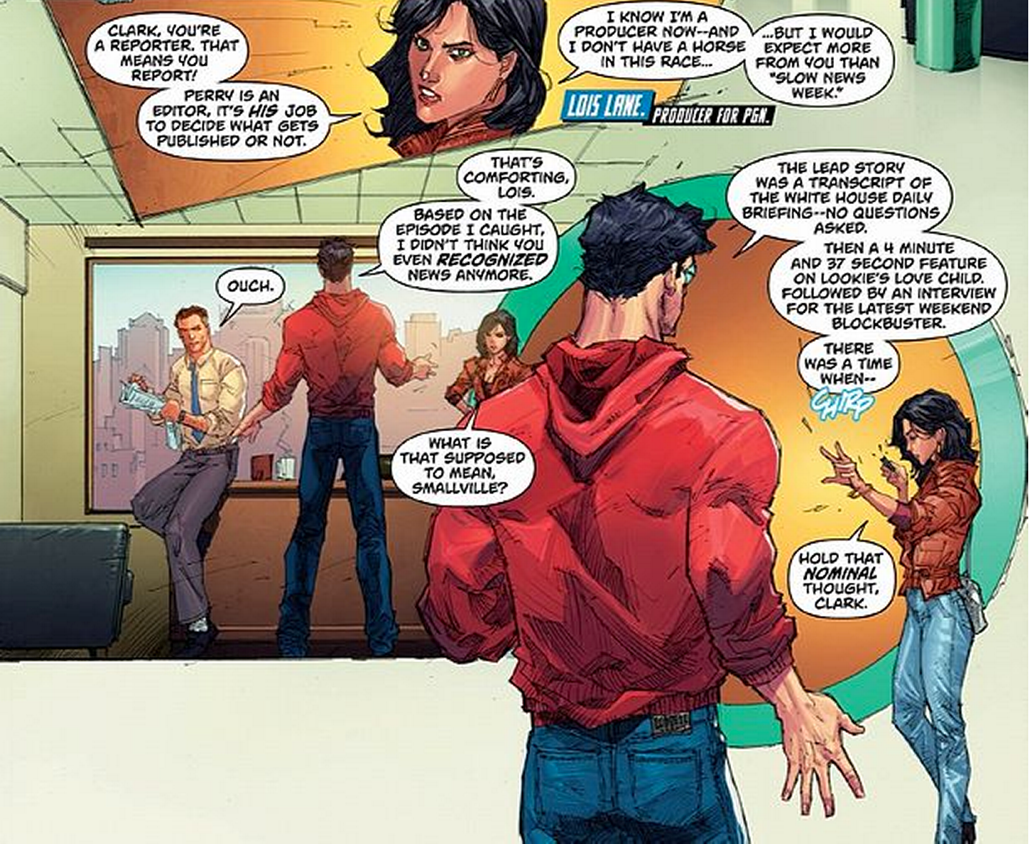As you may or may not know, Clark Kent apparently quit his job to become a blogger. It’s gotten a lot of mainstream media play (because the media likes to talk about the death of media, and bloggers like to talk about the rise of bloggers, natch.) Tim Hodler at TCJ is less impressed:
—Apparently Clark Kent quit his job or something? I’m not going to link to them (such behavior should not be rewarded), but newspapers are actually reporting on this comic-book plot point as if it is news. This continual urge on the part of the media to treat fictional events as newsworthy developments is the one thing comics as an art form has going for it that no other American art form seems to, but boy does it seem dumb.
Like Tim, I’m not going to read this comic. But I think most of his other comments here are kind of confused. First of all, other media get treated as newsworthy all the time. Movie releases are huge, high profile news events with no small frequency. Many media outlets (the Atlantic, for example) regularly devote space to episode recaps of television shows; the twist on Homeland was big enough news that I know there was a twist on Homeland even though I actually know just about literally nothing about Homeland. That stupid Aaron Sorkin show (the “Newsroom” right?) was reported on in much the same way the Superman-leaving-news is being reported on; that is, it was a media-enthusiastically-covering-the-media story. In fact, from the one page Andrew Sullivan is reproducing, the media reporting on entertainment is actually the reason Clark is leaving the Daily Planet — a nicely incestuous meta-twist to the nicely incestuous meta-memeness of it all.

In fact, I’d say that comics is actually far less likely to get these kinds of stories into mainstream outlets than other mass-entertainment — for the very logical reason that comics is a lot less popular than television or film or (for that matter) sports. It’s because having a story like this in the mainstream is novel that it’s noticeable.
Moreover, I’d say that getting media attention is a sign that DC is doing something right. Pulp entertainment is supposed to slavishly and shamelessly follow the zeitgeist; it’s supposed to be about whatever stupid shiny thing happens to be in the news. Mainstream comics are actually pretty bad at doing this, partly because they’re built around 40-70 year old characters, and mostly because their fanbase is incredibly hermetic and insular.
So a storyline like this — which effectively panders to a great big audience rather than to the same old tiny audience — seems like a step forward, to me. Someday, maybe, in some golden dawn, mainstream pulp comics can rise out of their subterranean level of shittiness, and attain the relatively elevated mediocre shittiness of 24 or Homeland or Breaking Bad. Dare to dream.
Update: Tim has interesting clarifications in comments, as do several other folks, so please be sure to scroll down.
